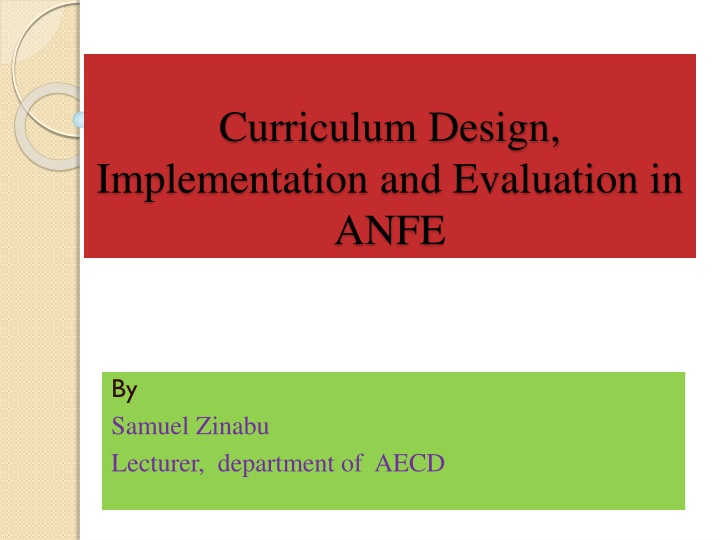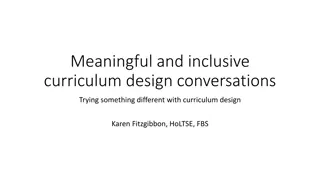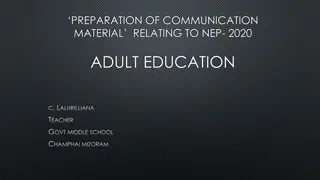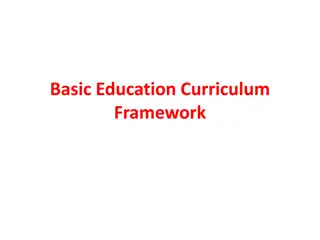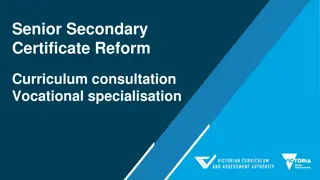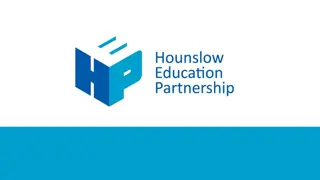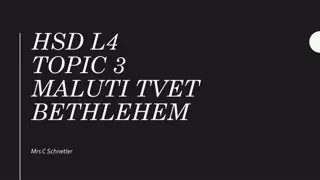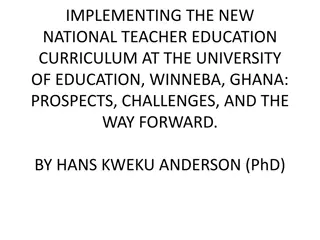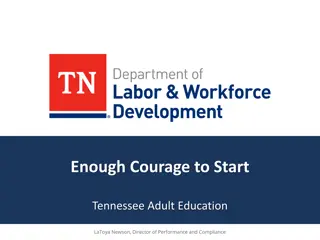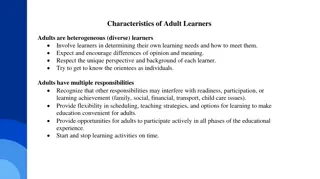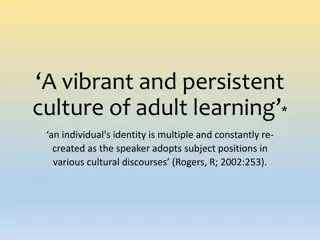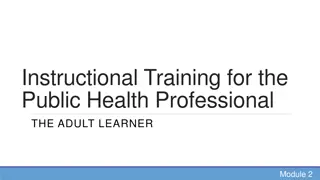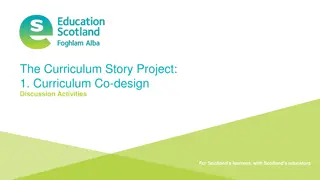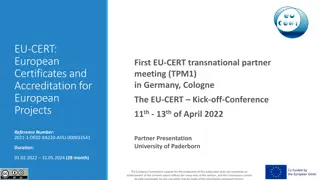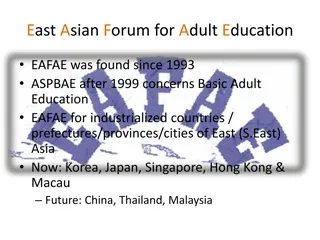Curriculum Design and Implementation in Adult Education
This resource explores the concept of adult education, defining criteria for adulthood, difficulties in defining adults, and characteristics of an adult. It discusses legal, physical, and social criteria for defining adults and examines the distinctions between children and adults. The content also delves into the maturity aspects of adulthood and the responsibilities and self-control associated with being an adult.
Download Presentation

Please find below an Image/Link to download the presentation.
The content on the website is provided AS IS for your information and personal use only. It may not be sold, licensed, or shared on other websites without obtaining consent from the author.If you encounter any issues during the download, it is possible that the publisher has removed the file from their server.
You are allowed to download the files provided on this website for personal or commercial use, subject to the condition that they are used lawfully. All files are the property of their respective owners.
The content on the website is provided AS IS for your information and personal use only. It may not be sold, licensed, or shared on other websites without obtaining consent from the author.
E N D
Presentation Transcript
Curriculum Design, Implementation and Evaluation in ANFE By Samuel Zinabu Lecturer, department of AECD
CONCEPT OF ADULT EDUCATION Who is an adult? Criteria for defining Adult Difficulties in defining adult Distinction between adult and Juvenile Adult Education-How to become an adult? Adult education-some misconceptions and Basic Concepts Definition of Adult education Scope of adult education Nature and characteristics of Adult education Objective and Goals of adult education
Who is an Adult? Oxford advanced learners dictionary (1995) defines adult as a person 1. a) grow to full size or strength b) intellectually and emotionally mature 2. Legally; old enough to marry, vote, etc
Criteria for Defining Adult Age (Legal or otherwise ) Maturity (Physical, biological, social, Psychological, etc) Experience Citizenship with full rights and duties Legal age (of adulthood)-for franchize for marriage, for male , for females vary from country to country) Different criteria, often two or more , used
Difficulty in Defining Adult Theoretical Practical (Drawing boundaries) Adult hood divided in to stages and each stage defined separately- Erikson(1963): Sheey(1976) Distinction between child and adult whether it is essential- Legge (1982) Child Man or man child interms of their maturity
Characteristics of an Adult Adult is a person whom posses comprehensive traits or characteristics: Certain age (Legal or otherwise) Mature (physically, pschologically, mentally, emotionally, intellectually and morally)-identifies once own strengths and weaknesses and distinguishes between right and wrong Understanding of onces own rights and limitations and those others Sensible- ability to act responsibly and rationally Self control- exercise self control or restrain one self
X-cs continued. Focuses off-self with partial or full sacrifice for public cause of importance; Reflects due balance in piking/choosing actions involving not only gains and pleasures but also loss, danger, and pains Owns up responsibility for one s own actions on oneself Continues to exist as adult- Get to be a kid, youth, adult, or the old as and when required and continues to exist as adult Acts and reacts with kindness, compassion and reason and with long term perspective/goal towards self actualization
Real Adult-Distinction B/n Adult and Junvenile I think adults take responsibility for and clean up their own messes (emotional, domestic, culinary, environmental, whatever), unless physically or mentally incapacitated. Juneniles, whatever their physical ages make someone else clean up after them Cybercoitus interrupts (hit on May 9 2007)
Adult education- How to become an adult? Becoming an adult Not a sudden event Lifelong process Cumulative result- comes mostly from accumulation of age, observation, and experience over lifetime of an individual
How to become an adult? Becoming an adult Not a sudden event Lifelong process Cumulative result-comes mostly from accumulation of age, observation, and experience over lifetime of an individual
Adult Education-Some Misconceptions Literacy for the aged-in developing countries Only literacy generally-reading, writing, and arithmetic skills Literacy plus but outside the formal education system only-schools, colleges, universities etc. or only under non formal education system. Does not lead to any certification- certificates, diplomas, degrees, Leisure time spent-attending classes for remedial learning
Adult Education-Basic Concept More than literacy for the adults May or may not leads to certificates, diplomas, or degrees Ranges from leisure time spent on learning literacy on learning literacy or more as a remedial activity to achieving or acquiring formal certificate, diploma or university degree Formal, informal, non formal education-pre job, on the job, off the job, with job or without learning Closely related to the physical, social, political, economic, geographic, cultural and other conditions- encompasses all content, levels, methods and modes
Definition of Adult Education Starts at particular stage or level of education Lindman (1961) As a process- liveright and haygood (1969) Action/activity or a program- Paulo Freire (1970) Culmination of the education process- Faure et al (1972)
Definition Entire body of organized educational process, whatever content, level and method, whether formal or otherwise, whether they prolong or replace initial education in schools, colleges, and universities as well as in apparenticeship, whereby persons regarded as adults by the society to which they belong develop their abilities, enrich their knowledge, improve their attitudes or behavior, in the two fold perspective of full personal development and participation in balanced and independent social, economic and cultural development (UNESCO, 1976)
Scope of Adult education Includes all organized educational processes for adults- formal, informal or nonformal education Encompasses all content, levels, methods, and modes Prolongs or replaces initial education in schools, colleges, and universities-lifelong education (fundamental education, recurrent education, further education, continuing education, correspondence education, distance education, open learning education Develops-abilities, knowledge, attitudes, skills and behaviors Two fold development-full personal development and participation in development and welfare process
Nature and characteristics of Adult Education i. Purposive- community specific, culture specific ii. Participatory or problem solving iii. Learner centered, systematic, flexible, and relevant iv. Need based and action oriented v. Dynamic, change-oriented-transformative vi. Awareness process and conscientization/level of thinking/ process vii. Experiential and Network building activity viii. Goal directed- education for empowerment, welfare and development oriented, quality of life, or standard of living oriented.
Objectives of Adult Education Imparting literacy of diverse types- basic literacy, scientific literacy, visual literacy, information literacy, multicultural literacy, technological literacy, information literacy, global literacy, legal literacy, computer literacy etc Generating awareness on various matters/ subjects- self, society and the nation- individual, relational, and collective roles and responsibilities Society, economy, polity, culture, environment, health, hygiene etc. Peace and harmony, growth, development and welfare-nation and the world. Promoting Functionality- for promoting larger public participation in various activities, for solving the problems, for bringing out social, economic , cultural, political transformation and for raising the general level or standard of living of the individual, community, nation and the world.
Cont The learning happens in many ways and in many contexts just as all adults' lives differ Adult learning can be in any of the three contexts, i.e. Formal Structured learning that typically takes place in an education or training institution, usually with a set curriculum and carries credentials;
Cont Non-formal Learning that is organized by educational institutions but non credential. Non-formal learning opportunities may be provided in the workplace and through the activities of civil society organizations and groups; Informal education Learning that goes on all the time, resulting from daily life activities related to work, family, community or leisure.
What is curriculum? The word curriculum comes from the Latin word Currier which means "a course for racing."
Curriculum has numerous definitions, which can be slightly confusing. In its broadest sense a curriculum may refer to all courses offered at a school. This is particularly true of educational institutions at the university level
Curriculum can be defined broadly as dealing with the experiences of the learner. This view considers almost anything in school as part of a curriculum. Curriculum can also be considered in terms of subject matter (such as, mathematics, science, English, history, etc.) or content which means the way we organize and assimilate information.
A curriculum may also refer to a defined and prescribed course of studies, which students must fulfill in order to pass a certain level of education. Meaning all the subjects that will be taught during a school year and the criteria to pass and fail.
Cont Despite the variations in the definitions of curriculum, the following are considered as common ones: 1.Curriculum is a document that elaborates the general educational aims, contents, the learning experiences, educational materials and the evaluation mechanisms to be employed.
Cont 2. Curriculum is a discipline that studies about educational development process (planning, implementing, evaluating) including mechanisms of change and improvements.
Summary From the preceding discussion one can learn that; the term curriculum is fluid in that different educators define it differently. Some consider it as subject matter/ content others as planned learning experiences acquired in school. Still others consider it as a planned program of learning. Some others consider it as learning experiences acquired in life under the auspice of a school. From these conceptualizations of curriculum it can be deduced that curriculum includes not only the planned school experiences but also it includes the unplanned/unintended learning experiences of schooling as well.
Andragogy: An Introduction and Implications for Curriculum and Instruction Originally Knowles defined andragogy as the art and science of helping adults learn, in contrast to pedagogy as the art and science of teaching children.
Andragogical Assumption: Implications for facilitation and curriculum Andragogical assumptions/adult learning principles: 1. The need to know. 2. The learners self-concept 3. The role of the learners experiences. 4. Readiness to learn. 5. Orientation to learning. 6. Motivation
1. The need to know Adults need to know why they need to learn something before undertaking to learn it. Tough (1979) found that when adults undertake to learn something on their own, they will invest considerable energy in probing into the benefits they will gain from learning it and the negative consequences of not learning it. Implication for instruction/facilitation Consequently, one of the new aphorisms in adult education is that the first task of the facilitator of learning is to help the learners become aware of the need to know. The facilitator should show the desrcrepancy between what the learners have and the desired knowledge/skill/attitude Aware the purpose of each session.
Cond Implications for curriculum Objectives of the course or/ and topics should be elaborated in the curriculum. The required effort and the perceived benefit of the content should be elaborated.
2. The learners self-concept Adults responsible for their own decisions, for their own lives. Once they have arrived at that self-concept, they develop a deep psychological need to be seen by others and treated by others as being capable of self-direction. They resent and resist situations in which they feel others are imposing their wills on them. have a self-concept of being
Contd Implications for instruction/facilitation The facilitators should treat learners as matured and responsible for their learning Participate learners in all spheres of the facilitation process; teaching/ facilitation methods, assessment and evaluation etc. need assessment,
Contd Implication for curriculum Participating adult learners in the curriculum development, implementation and evaluation process like; Need assessment Selecting the learning experiences and the learning contents Implementation Evalution Incorporating the learners needs and interests in the curriculum
3. The role of the learners experiences. Adults come into an educational activity with both a greater volume and a different quality of experience from that of youths. By virtue of simply having lived longer, they have accumulated more experience than they had as youths. But they also have had a different kind of experience. This difference in quantity and quality of experience has several consequences for adult education.
Contd Implication for instruction/facilitation Respecting variety of adult learners experiences, adults will perceive that rejecting their experience is as rejecting themselves as persons. Use their experiences in the classroom Make learners to share their experiences and employ the experiential techniques
Contd group discussions, simulation exercises, problem solving activities, case methods, and laboratory methods instead of transmittal techniques. Also, greater emphasis is placed on peer- helping activities.
Contd.. Implication for curriculum The curriculum development process should take account the learners experiences Should acknowledge prior learning experiences of the learners and the learning contents and learning experiences should be emerged from the learners experiences
4. Readiness to learn Adults become ready to learn those things they need to know and be able to do in order to cope effectively with their real- life situations. An especially rich source of readiness to learn is the developmental tasks associated with moving from one developmental stage to the next.
Contd. The critical implication of this assumption is the importance of timing learning experiences to coincide with those developmental tasks. For example, a sophomore girl in high school is not ready to learn about infant nutrition or marital relations, but let her get engaged after graduation and she will be very ready. Bench workers are not ready for a course in supervisory training until they have mastered doing the work they will supervise and have decided that they are ready for more responsibility.
Contd. Therefore, the curriculum should be inline with the preferences of the learners
5. Orientation to learning In contrast to children s and youths subject- centered orientation to learning (at least in school), adults are life-centered (or task-centered or problem-centered) in their orientation to learning. Adults are motivated to learn to the extent that they perceive that learning will help them perform tasks or deal with problems that they confront in their life situations. Furthermore, they learn understandings, skills, values, and attitudes most effectively when they are presented in the context of application to real-life situations. new knowledge,
Contd Implications for instruction/facilitation Focus on problem solving skills Each adult learner may have unique problems to be addressed. So the facilitator is expected to plan with the broader area that most of the learners faced. For example the one may have a problem of reading, the second will have a gap of writing, and another adult learner still will have a gap of numeracy/simple calculation. Therefore, the facilitator may plan to deliver contents on basic literacy issues in the classroom. Finally, the facilitator and the learners will evaluate as the number of problems of the adult learners solved against their plan. Relate the concepts and theories with the adults live. Therefore, learning should emphasize on performance and skill improvement (Kadir, 2016) which has an immediate application in the adult learners lives.
Contd Implication for curriculum Focus on contents that brings immediate life change for learners The learning content should be vocational and practical which is related to the adult learners livelihood and interest that will fill the gap of the adult learners. They do not want to learn unless the content of the learning is they need to know and has a potential to solve their practical problem. Integrating courses or subjects with the adults live
6. Motivation. Adults are responsive to some external motivators (better jobs, promotions, higher salaries, and the like), but the most potent motivators are internal pressures (the desire for increased job satisfaction, self-esteem, quality of life, and the like). Tough (1979) found in his research that all normal adults are motivated to keep growing and developing, but this motivation is frequently blocked by such barriers as negative self-concept as a student, inaccessibility of opportunities or resources, time constraints, and programs that violate principles of adult learning.
Contd Implication for Instruction/facilitation Give emphasis for internal motivators Helping adults to achieve their goal Remind how each activity will help them to achieve their goal Recognition, concern, and respect of their values, times, effort, energy are successful to attract the adult learners Implication for curriculum Making the learning contents meaningful and relevant to their daily life activity has a vital role to keep and sustain the learners motivated.
Participation the action or state of taking part in something. Much of the current interest in participation also stems from the concerns of Paulo Freire, the Brazilian educator, who regards people as critical and creative beings capable of knowing and transforming their environments. In Freire s view, education can humanize, liberate and treat people as subjects who control their own lives; or it can domesticate, oppress, and treat them as objects to be manipulated.
Contd For education to be humanizing, according to Freire, it must involve the learners in a process of problem posing in which they describe, analyse, and act to redesign their realities. This process can only be done in a context of true communication; one in which learners and facilitators trust and respect one another (Freire, 1990).
Contd.. A commitment to participation is also reflected in the work of several authors who emphasize group action as a central process in adult education program. When conceived of as an empowering process, adult education program assume several distinctive characteristics that relate to participation. Therefore, Participation is a soul of adult education
Types of Participation 1. representational participation; 2. information-sharing; 3. consultation; 4. joint decision-making; 5. acting together; and 6. building independent community initiatives.
1. Representational participation Representational participation is based on the conscious effort of the program developer to select individuals who represent a broad cross section of needs and interests of the community chosen for an adult education program.
